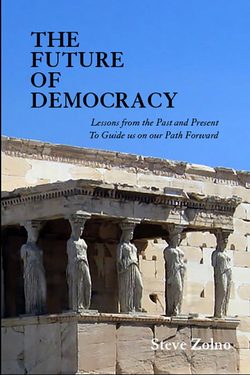THE FUTURE OF DEMOCRACY

Реклама. ООО «ЛитРес», ИНН: 7719571260.
Оглавление
Steve Zolno. THE FUTURE OF DEMOCRACY
THE FUTURE OF DEMOCRACY
Contents
Preface & Acknowledgments
Introduction
Cooperation Based on Trust
The Consequences of Distrust
Rebuilding Trust
Democracy and Human Dignity
Endnotes
Chapter I. Democracy’s Past
From Prehistory to History
The Second Millennium
1000-1500
1500-2000
World War I
The Great Depression
World War II
Summary and Possible Lessons
The Path to Democracy
1. COMPETITION AND COOPERATION
2. “US” VS. “THEM”
3. TRUST AND DISTRUST
4. A BELIEF IN JUSTICE
5. EQUALITY VS. INEQUALITY
6. THE PERSISTENCE OF THE PAST
7. THE LIMITS OF KNOWLEDGE
8. RESPECT VS. DISRESPECT
Endnotes
CHAPTER II. Democracy’s Present
BRITAIN
CHINA
FRANCE
GERMANY
RUSSIA
UNITED STATES
BRAZIL
GREECE
EGYPT
INDIA
SOUTH AFRICA
SUMMARY AND POSSIBLE LESSONS
Stability and Instability
The Role of Government in Encouraging or Discouraging Human Potential
Questions to Consider
A Delicate Balance
Endnotes
CHAPTER III. Democracy’s Future
CHILDHOOD
EDUCATION
JUSTICE
THE ECONOMY
THE ENVIRONMENT
HEALTH CARE
RELIGION
SCIENCE AND INNOVATION
THE HUMAN MIND
VIOLENCE AND WAR
INTERNATIONAL RELATIONS
POLITICS AND GOVERNMENT
Conservative and Liberal Values
Guide to voting in a democracy
SUMMARY AND POSSIBLE LESSONS
Endnotes
REFERENCES
Index
Отрывок из книги
THE FUTURE OF DEMOCRACY
By Steve Zolno
.....
An attempt to free the Church from political influence came about under Pope Gregory VII, starting in 1073, who declared that he had the ultimate authority on earth, including the ability to depose kings.104 He forbade the marriage of priests and outlawed the sale of Church offices. He separated the spiritual from the secular worlds, but with that opened new possibilities for the establishment of secular rule.
After the year 1000, what historians call “the rule of law” – a legal system where those who make the laws also are subject to them – became more firmly established in the West. Genuine rule of law is largely tied to economic growth and human creativity. States where people feel oppressed are less likely to create the trust needed for a robust economy. Rule of law also allows individuals to go about their daily lives – including holding and transferring property – without interference from government, except when they are challenged through legitimate governmental channels based on laws.
.....